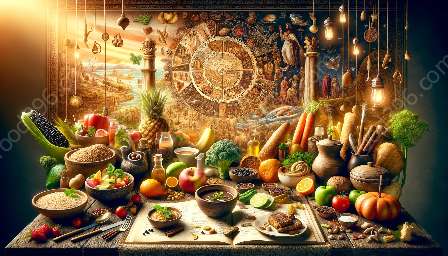Veganism is a way of living that seeks to exclude all forms of exploitation and cruelty to animals for food, clothing, or any other purpose. While veganism has gained significant attention in modern times, it is important to recognize its historical roots, including its association with religious traditions and its impact on the evolution of vegan cuisine.
Veganism in Religious Traditions
Many religious traditions have embraced the principles of veganism or plant-based diets as part of their spiritual practices. These traditions often emphasize compassion, non-violence, and the interconnectedness of all beings, which aligns with the ethical foundations of veganism.
Buddhism
Buddhism is one of the oldest religions that has promoted vegetarianism and veganism for centuries. The teachings of Buddha emphasize non-harm towards all living beings, and many Buddhist monks and followers adhere to a strict vegetarian or vegan diet as a way to practice compassion and avoid causing suffering to animals.
Jainism
Jainism, another ancient religion, prohibits the consumption of any animal products and advocates for a vegetarian or vegan lifestyle. Jains believe in ahimsa, or non-violence, and follow a strict diet that excludes all forms of meat, fish, and eggs to uphold their ethical principles.
Hinduism
Hinduism, a diverse religious tradition, has a long history of plant-based diets, with many adherents choosing vegetarian or vegan lifestyles based on their cultural and ethical beliefs. The concept of ahimsa, or non-violence, is central to Hinduism, and it has influenced the dietary choices of many Hindus who seek to minimize harm to animals.
Christianity and Islam
While Christianity and Islam do not have strict dietary restrictions like Buddhism, Jainism, and Hinduism, various sects and individual practitioners within these traditions have adopted vegan or vegetarian diets for ethical reasons. Some Christian and Islamic teachings emphasize stewardship of the earth and compassion for animals, leading to the promotion of plant-based diets as a way to embody these values.
Influence on Vegan Cuisine History
The historical roots of veganism in religious traditions have significantly influenced the development of vegan cuisine throughout history. The principles of compassion, non-violence, and ethical consumption embedded in these religious practices have shaped the way people approach food and cooking, leading to the creation of a wide variety of plant-based dishes and culinary traditions.
Middle Eastern and Mediterranean Cuisine
The influence of religious practices, including vegetarianism and veganism, can be seen in Middle Eastern and Mediterranean cuisines. These regions have a rich history of plant-based dishes, such as falafel, hummus, tabbouleh, and stuffed grape leaves, which have been enjoyed for centuries and reflect the culinary heritage shaped by the dietary preferences of various religious communities.
Indian Cuisine
Indian cuisine, deeply rooted in Hinduism and Jainism, has a long-standing tradition of vegan and vegetarian dishes. The use of legumes, vegetables, and aromatic spices has resulted in an array of flavorful and diverse plant-based recipes, including daal, vegetable curries, and biryanis, that have become integral parts of Indian culinary heritage.
East Asian Cuisine
In East Asian countries like China, Japan, and Korea, Buddhist dietary traditions have left a lasting impact on local cuisines. Tofu, tempeh, and a wide variety of plant-based ingredients are celebrated in vegetarian and vegan dishes that have been passed down through generations, contributing to the rich tapestry of East Asian culinary history.
European and American Cuisine
While European and American cuisines have traditionally been meat-centric, the influence of religious and ethical considerations has led to the development of vegan alternatives and plant-based adaptations of classic dishes. From hearty stews to decadent desserts, the innovation and creativity within vegan cuisine have reshaped traditional recipes and introduced new flavors and textures to global culinary landscapes.
Modern Vegan Cuisine
Today, the intersection of veganism, religious traditions, and culinary history continues to inspire contemporary vegan cuisine. Chefs, home cooks, and food enthusiasts draw inspiration from diverse cultural and religious influences to create innovative plant-based dishes that honor the principles of compassion, sustainability, and health.
Global Culinary Fusion
The fusion of traditional and modern culinary techniques has given rise to a global movement of vegan cuisine that celebrates the diversity of flavors, textures, and ingredients from different cultural backgrounds. From plant-based sushi to veganized comfort foods, the fusion of religious, cultural, and culinary elements has expanded the possibilities of vegan dining experiences.
Embracing Tradition and Innovation
While respecting the historical and religious foundations of vegan cuisine, contemporary chefs and home cooks continue to push the boundaries of creativity by experimenting with innovative cooking methods, plant-based substitutes, and sustainable ingredients. The evolution of vegan cuisine reflects a dynamic balance between honoring tradition and embracing new culinary expressions.
Health and Wellness
Beyond cultural and religious significance, vegan cuisine has also become intertwined with health and wellness movements. The emphasis on whole foods, fresh produce, and mindful eating aligns with the holistic principles promoted by many religious traditions, highlighting the interconnectedness of ethical consumption, personal well-being, and environmental sustainability.
Conclusion
Veganism in religious traditions has a deep-rooted history that has shaped the development of vegan cuisine around the world. The cultural significance of plant-based diets, influenced by ethical and spiritual considerations, has contributed to the diversity and richness of culinary traditions. As modern vegan cuisine continues to evolve and thrive, it remains connected to its historical and religious origins, serving as a testament to the enduring impact of veganism on the global culinary landscape.

